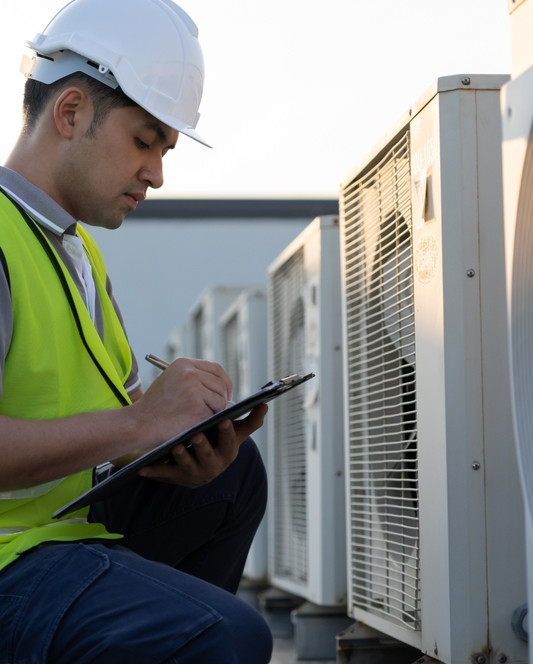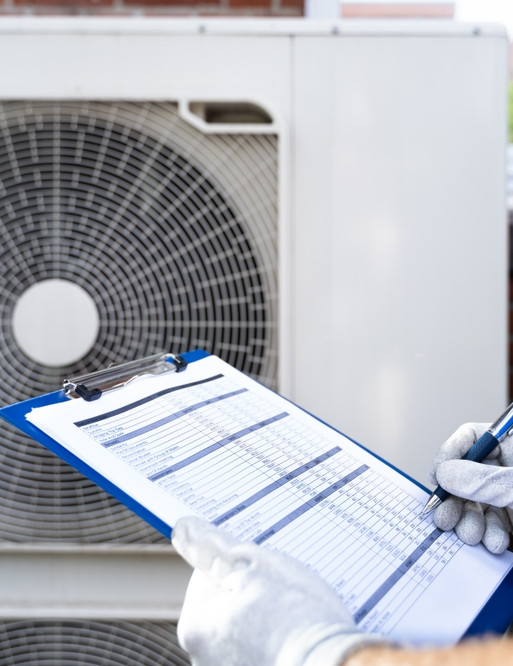How to get an Air Conditioning Inspection Report
If you do not get your air conditioning inspected every 5 years, you could be fined £300. To obtain an air conditioning inspection report, contact ESS Green Skills. Our trained and accredited Air Conditioning Inspectors will assess your system to ensure it complies with regulations.
Get Inspection Report Now
-
How much does a TM44 inspection cost?
A TM44 air conditioning inspection with Essential Green Skills starts from £200. The total cost depends on the size and complexity of the air conditioning system being assessed, as larger systems typically require more detailed inspections. For an accurate quote based on your specific system, feel free to contact us directly.
-
What are the regulations?
The law requires that all air conditioning systems with an effective rated output of more than 12 kW must be inspected regularly to ensure compliance.
These inspections, which must occur at least every five years, will examine the refrigeration and air-moving equipment to ensure efficiency and proper operation.
-
Why do I need an air conditioning energy inspection?
Completing an inspection will demonstrate compliance with the regulations and provide an opportunity to look at recommendations which could improve the efficiency of the system.
Failure to complete an inspection every five years could result in a fine of £300.
Which systems require an air conditioning inspection?
Only air conditioning systems with an effective rated output of more than 12kW are subject to inspection regulations. This includes systems with individual units under 12kW if their combined output exceeds 12kW.
Effective Rated Output:
- Defined as the maximum calorific output (in kW) during continuous operation, as specified by the manufacturer.
System Definition:
- Multiple units controlled by one person within a building are considered a single system.
Air Conditioning System:
- Includes all components for air treatment (temperature control, ventilation, humidity, and air cleanliness).
- Applies to systems using refrigeration for cooling occupant comfort.
Inspection Scope:
- All systems providing occupant comfort must be inspected.
- Systems used solely for industrial processes, like cold stores or pharmaceutical production, can also be inspected but are not the focus of this guidance.
Ensure your air conditioning systems comply with inspection regulations to maintain efficiency and comfort.

Air conditioning inspection reports
An air conditioning system inspection, also known as a TM44 inspection, by an accredited Air Conditioning Energy Assessor aims to:
-
Identify
the energy efficiency of your current equipment
-
Recommend
improvements
-
Report
any faults and suggest actions
-
Provide information
on reducing air conditioning use
This inspection results in a report that helps you reduce energy consumption, operating costs, and carbon emissions.
The inspection is an on-site visual assessment of your air conditioning system, including an examination of the equipment and controls. The energy assessor will suggest ways to enhance the operation of existing systems or recommend replacing older, less efficient, or oversized systems with modern, energy-efficient units. With restrictions on the replacement of refrigerants in older systems, there's an additional incentive to upgrade to more efficient units.
Building owners or managers are responsible for ensuring the proper operation and maintenance of air conditioning systems, complying with statutory obligations, and promoting energy efficiency.
Importance of routine maintenance
Inspection, maintenance, and cleaning programs are essential to maintaining a healthy and comfortable environment for building occupants. These practices limit the escape of refrigerant gases and ensure the safety of the equipment. They should be performed more frequently than the energy efficiency assessments described here. Regular maintenance helps sustain system performance and prolong its lifespan, further supporting both environmental and economic objectives.
By complying with these inspection and maintenance requirements, you enhance the performance and lifespan of your air conditioning systems, ensuring a safe and comfortable environment while supporting broader environmental and economic goals.
Penalties for not having an air conditioning inspection report
Local Trading Standards Officers enforce air conditioning inspection report requirements. Failure to have, keep, or provide an inspection report can result in a penalty charge notice.
-
Enforcement and Requests:
- Trading Standards Officers can request a copy of the inspection report.
- Building owners or managers must provide the report within seven days of the request.
- Failure to comply can result in a £300 penalty.
Additional Penalties:
- Not providing the report within seven days when requested can lead to a £200 penalty.
-
Occupier Liability:
- Occupiers are not liable if the building owner or manager controls the air conditioning system.
Appeals:
- If a penalty charge is disputed, a review can be requested.
- If unsatisfied with the review, an appeal can be made to the county court within 28 days.
-
Impact on Property Transactions:
- Selling or letting a building without the required inspection report may negatively affect the transaction.
- Legal advisors for prospective tenants or buyers will likely request the report.
What advice is provided by the air conditioning inspection and report?
An air conditioning inspection and report, conducted by an accredited Air Conditioning Energy Assessor, provides comprehensive advice aimed at improving the efficiency and performance of your air conditioning system.
By following the advice provided in the inspection report, building owners and managers can achieve significant benefits, including reduced energy consumption, lower operating costs, improved system longevity, and a positive impact on environmental sustainability.
The key pieces of advice include:
-
Energy Efficiency Assessment
Evaluates how efficient your current air conditioning equipment is.
Identifies areas where energy consumption can be reduced.
-
Recommendations for Improvement
Suggests actionable steps to enhance system performance and efficiency.
Highlights opportunities to upgrade or replace older, less efficient, or oversized systems with newer, energy-efficient units.
-
Fault Identification and Corrective Actions
Detects any faults in the system.
Recommends specific actions to address these faults and improve system reliability.
-
Usage Reduction Strategies
Provides guidance on how to reduce overall air conditioning use.
Advises on optimal operation practices to maintain comfort while saving energy.
-
Maintenance and Cleaning Programs
Emphasises the importance of regular maintenance and cleaning to ensure the system operates efficiently and safely.
Advises on best practices to maintain a healthy and comfortable environment for building occupants, limit refrigerant gas escape, and ensure equipment safety.
Who is responsible for ensuring an inspection is completed?
The person controlling the operation of an air conditioning system must:
- Ensure inspections are done according to regulatory requirements and timelines.
- Keep the latest air conditioning inspection report from an energy assessor.
- Provide the inspection report to any new person taking over control of the system.
If control is transferred and the new operator has not received an inspection report, the system must be inspected within three months of the transfer.
Who controls an air conditioning system?
The person who controls an air conditioning system is responsible for its technical functioning, not just adjusting the temperature or controls. Typically, this is the system owner, even if daily operations are contracted out. If a building occupier has full responsibility for the building and its services, they control the system.
When facilities management or servicing companies handle day-to-day operations or maintenance, the contract may designate them as the system controller, responsible for ensuring inspections. However, landlords or building occupiers also have a parallel duty to ensure inspections are conducted. If the occupier installs the air conditioning system, they own and control it.

Am I required to keep the air conditioning inspection report?
Yes, you must keep the air conditioning inspection report in a safe place. It should be stored with maintenance and energy records, ideally in a building logbook. This logbook, which complies with Part L of the Building Regulations, is the best place to store all related inspection records, including those for fluorinated greenhouse gases.
If a logbook isn't available, keep the report with the building’s operation and maintenance documents.
Retain the following:
-
Signed inspection report
-
Recommendation report
-
Data for EPC or DEC, if applicable
-
Reports from other regular inspections
This helps with future inspections and minimises inspection time.

